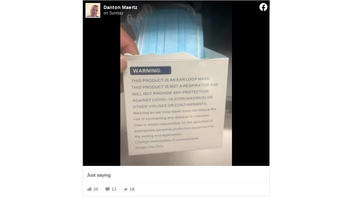
Are nonsurgical ear-loop masks useless at offering protection from COVID-19? No, that's not true: While the labeling on an ear loop mask box does say the wearer is not protected from COVID-19, the purpose of a mask is to protect other people from viruses that may be spread by the wearer. Studies concluded the mask protects other people who are near the person wearing the mask. Research published on June 24, 2020, found the health payoff would be enormous if 95% of Americans wore face masks in public during the 2020 pandemic.
The latest "masks-don't-help" claim appeared in a photo (archived here) of a mask box label published on Facebook on June 21, 2020, under the title "Just saying." It opened:
WARNING: THIS PRODUCT IS AN EAR LOOP MASK. THIS PRODUCT IS NOT A RESPIRATOR AND WILLL NOT PROVIDE ANY PROTECTION AGAINST COVID-19 (CORONAVIRUS) OR OTHER VIRUSES OR CONTAMINANTS. Wearing an ear loop mask does not reduce the risk of contracting any disease or infection.
This is what the post looked like on Facebook at the time of writing:
(Source: Facebook screenshot taken on Fri Jun 26 17:07:45 2020 UTC)
If 95% of Americans wore masks in public, it could prevent 33,000 deaths by October 1, 2020, according Dr. Christopher Murray, director of the University of Washington's Institute for Health Metrics and Evaluation:
There is no doubt that even as states open up, the United States is still grappling with a large epidemic on a course to increase beginning in late August and intensifying in September. People need to know that wearing masks can reduce transmission of the virus by as much as 50 percent, and those who refuse are putting their lives, their families, their friends, and their communities at risk.
Further, the Centers for Disease Control and Prevention issued a new recommendation on June 25, 2020, saying
everyone should wear a face mask when going out in public, for example to the grocery store or to pick up other necessities.
The evidence is mounting in favor of universal mask-wearing because even non-surgical (cloth, ear-loop and tie-back) models do block people's exhalations from reaching others. A Cornell University study found that if 70% of the general public wore masks and contact tracing were conducted efficiently, epidemic growth would be flattened within four days in the hardest hit countries.
This is because aerosolized mist and larger droplets expelled during conversation or coughing/sneezing would not escape into the air that others breathe.The CDC points out that in a room with other people,
Your cloth face covering may protect them. Their cloth face covering may protect you.
It is true that the cloth masks with ear loops do not offer the same degree of protection as, say, an N-95 facial respirator. But they serve the purpose of blocking the expulsion of droplets during conversation, singing, coughing/sneezing, according to the CDC and respected medical experts at the Mayo Clinic.
A Mayo public information page affirms that wearing masks does slow the spread of Covid-19. "Ear loop" masks made of multiple layers serve a purpose. Mayo advises making the mask snug (which can be done by adjusting the loops).
Asking everyone to wear cloth masks can help reduce the spread of the coronavirus by people who have COVID-19 but don't realize it, the report states.
The Occupational Safety and Health Administration (OSHA) guidelines state that cloth/non-respirator masks
Are worn in public over the nose and mouth to contain the wearer's potentially infectious respiratory droplets produced when an infected person coughs, sneezes, or talks and to limit the spread COVID-19 to others.
Testing shows that 25 percent of people who catch Covid-19 don't show any symptoms at all. Yet they walk among others and spread the virus. If they wore masks to block the droplets they exhale with every breath and conversation, all those in the store or room or elevator with them would be safer. (CDC)
"Feeling healthy doesn't necessarily mean you don't have it," the agency states.
Lead Stories has debunked several stories making the same false claims that masks do not help. One such story debunks five reasons not to wear a mask.
OSHA addresses the role masks play in preventing viral spread from asymptomatic carriers. The agency recommends:
employers encourage workers to wear face coverings at work. Face coverings are intended to prevent wearers who have COVID-19 without knowing it (i.e., those who are asymptomatic or pre-symptomatic) from spreading potentially infectious respiratory droplets to others. This is known as source control.
OSHA recommends using facemasks to cover a person's mouth and nose to prevent spread of respiratory secretions because of the potential for asymptomatic and pre-symptomatic transmission. Now, source control measures are recommended for everyone in a healthcare facility, even if they do not have symptoms of COVID-19 according to a June 19 CDC publication.
A CDC video shows what happens when someone coughs or sneezes and gives visible proof of the value of a mask that covers the lower face. It proves that exhaled drops both spray outward andy upward where they hang in the air (as aerosolized droplets) for someone to pass by and inhale.
Anyone who watches it would want other people to block the spray by wearing a mask.
Fact-checking organization Politifact rated this Facebook post 'False' because people misinterpret such information to mean the masks are worthless.
Read earlier Lead Stories articles about false claims concerning face masks and COVID-19:
Fact Check: Meme Claiming Five Reasons Not To Wear A Face Mask Is Misleading
Fact Check: OSHA Did NOT Say Cloth Masks Don't Work And Will Reduce Oxygen To Danger Levels
Fact Check: Card Does NOT Exempt Anyone From Wearing A Mask In Public
Fact Check: The CDC DOES Recommend That People Who Are Healthy Wear Facemasks


















